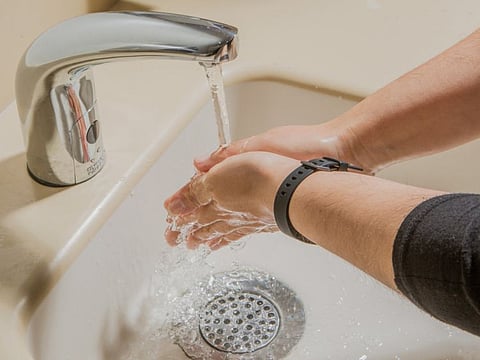Health, hygiene and all things viral
Mindfulness will help us get through these uncertain times with grace and calm

Little Princess can recite the Arabic alphabets by heart and there is a shiny bottle of strawberry-scented handwash that has taken a pride of place in our bathrooms.
While the world is sticking to the 20-second handwash recommendation by singing Happy Birthday twice, the smart mother in me thought it would fun to mix learning and hygiene.
I got Little Princess to sing the Arabic alphabets, which lasted a good 20 seconds, while she scrubbed her little hands squeaky clean. Every time I heard her sing, my insides gloated with pride over my ‘smart’ move to keeping learning alive with every handwash.
By the second day, the handwashing continued but she played smarter and the singing was outsourced to an Arabic learning application on my phone. Now every time she washes her hands, we all get to learn the Arabic alphabets.
The learning is on, just that it is on a wider scale.
Mindfulness is not going to create a vaccine or control the spread of the virus, raise the price of oil or boost the economy, get sanitisers back on the supermarket shelves or give you a reassuring hug at a time of social distancing
When the schools shut down to curtail the spread of the virus, there was little talk about marks, portions or learning loss. There was a collective sigh of relief that children would be in the confined safety of homes without the panic over the surfaces that they might touch or the people they might meet.
Fast forward two days into an unexpected break with no studies, activities, play dates, outings or classes for distraction, relief was laced with frustration. The frustration of having cartoons running in loops in the background while trying to get work done.
Unexpected break
I knew I had to spring into action when I caught myself humming the Peppa Pig theme song while washing my hands, and that was not because the song had a duration of less than 20 seconds, but because I knew that while I was keeping my children safe from the virus, their increased reliance on screens would give them glasses as thick as soda bottles by the end of the unexpected break.
When the screens were forced out of the way, board games were brought out. Chess, Pictionary, Scrabble, Monopoly ruled a few hours of their day. A collection of classics that remained untouched kept Sid company while Little Princess followed suit and picked up an Aesop’s Fable collection.
Unshackled from time-pressed routines that we were normally chained to, there was time for unhurried meals where we relished every bite and conversation. When social media became a hub that thrived on spinning horrors, it no more drank into the hours of the clock forcing us to engage in the old-fashioned way of two humans attempting to sustain an eye contact between engaging in conversation, and the newspaper became the most reliable window into getting to know how the world was coping.
Hoarding sanitisers
At a time of the year when we should be discussing broken resolutions, climate change and methods to increase life expectancy, our worries loom large around a virus. When we should be channelling our investments into stocks, shares and sleek gizmos, we are investing on hoarding hand sanitisers and face masks.
In a world with civil wars, power games and space races, our fight is now centred to the human race versus a virus.
At this time of uncertainty that has forced us to slow down instead of racing into the future, we could use the time to align our thoughts, rethink our priorities and exercise mindfulness.
Social distancing
Mindfulness is not going to create a vaccine or control the spread of the virus, raise the price of oil or boost the economy, get sanitisers back on the supermarket shelves or give you a reassuring hug at a time of social distancing. Mindfulness will help us get through these uncertain times with grace and calm, that in turn will help us make wiser choices.
Just remember to wash your hands for 20 seconds singing, dancing or learning your way to health and hygiene. Take care!
Pranitha Menon is a freelance writer based in Dubai. Twitter: @MenonPranitha



